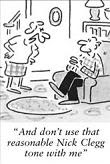
"You were the future once." Thus did Cameron mock Tony Blair during his first Prime
Minister's Questions in 2005. It was an effective line, said Rachel Sylvester in The Times, but
one that the Lib l>cm leader could now throw back at him. " Ireatcd — for the first time — as an
equal to Brown and Cameron", Clegg seized his chance, nimbly winning support from the
many voters who arc "fed up with labour but unconvinced by the Conservatives". Cameron
assumed he would automatically win the "change" vote, said lain Martin in The Wall Street
Journal. Now he finds himself in a nasty spot, with the Lib Dems tapping into popular
disenchantment even as his own "Big Society" message fails to gain traction. If Clegg can retain
the momentum — a "big if" — the old two-party system could be "blown apart", ushering in a
"new era of almost permanent coalition government".
Cameron mus! be nicing the day he agreed to the debates, said Andrew Rawnsley
in I he Observer. But Clcgg's success threatens Labour, too. While a modest Lib
Dem advance would help Brown by denying the Tories marginal seats in southern
and, a major surge would cat into Labour's core vote. So how to tackle the
rampant third party? Tory frontbencher Michael Gove has tried one line of attack,
describing the Lib Ucms as "outside the mainstream and a little bit eccentric". But
that argument is only likely to make the Lib Dems more popular with the public.
No leader can defeat the "anti-politics mood" in the next two weeks, and
Cameron shouldn't even try, said Matthew I'arris in The limes. But he can contest
the Lib Dcm's claim to be "the rightful beneficiary of the voters' rage". For all
Clcgg's righteous rhetoric in the leaders* debate, it "simply isn't the case that he or
his party arc in a different league of straight-talking, no-nonsense politics". He's a
party leader like the other two, "prey to the same constraints, the same small
dishonesties, the same necessary accommodations with the truth".
What next?
So what happens if we end u
with a hung parliament? As
the incumbent. Brown woult
Ik- entitled to stay in office
until he lost a motion of no
confidence, says Robert
I lazcll in I Tie Guardian.
Clcgg would have to decide
which party to negotiate wit!
- "he has no obligation to
choose the party with the
most scats – and
can pick the one
that makes him the
best office 1 Ic
would also have to
decide whether to
support a minority
government or seek
a coalition. The
latter might give
the Lib Dems more
power, but could
entail "hitching up
to a Labour Party
in decline".
Aucun commentaire:
Enregistrer un commentaire